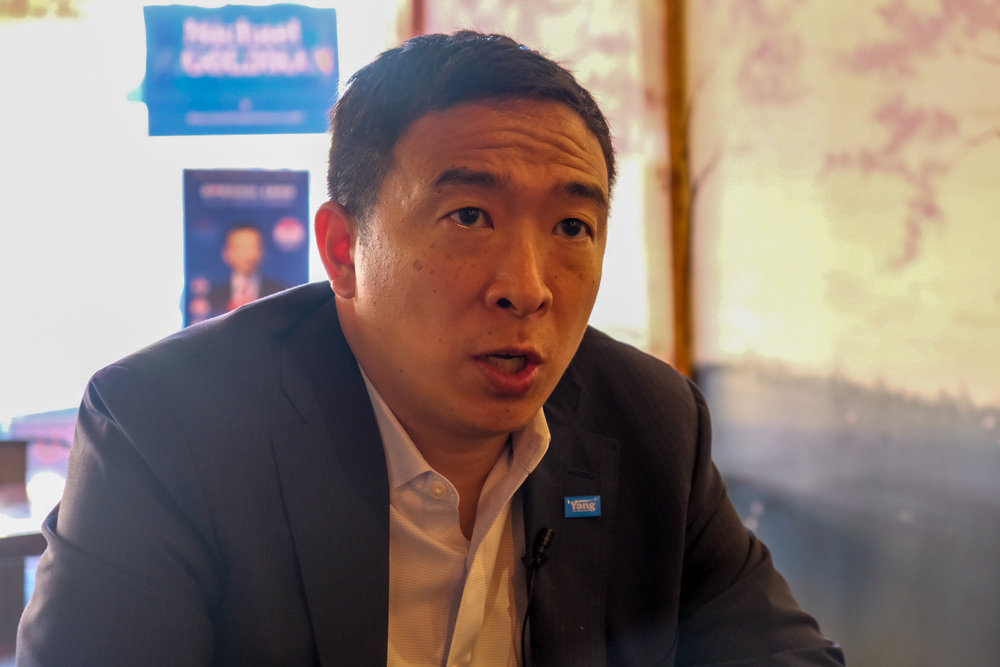A New York City mayoral campaign is an entirely different beast than a presidential campaign. However, the former has some perks.
“The food is infinitely better,” Andrew Yang joked while eating an array of authentic Chinese dishes. “When I am campaigning in New York I can just stop and get food somewhere, but when I was running for president it was like ‘well I’m in Iowa, what am I going to eat!’”
This past Sunday, Yang ventured to Spy C Cuisine in Forest Hills for lunch and a conversation with the restaurant’s owner, Thomas Lo. The Democratic candidate discussed the experience of running for mayor in the largest city in the country and detailed his plans for confronting problems that he believes are crucial to New Yorkers.
“The issues are more varied and local, and I like that you see very clearly how we can make people’s lives better here in New York,” Yang explained. “One of the consistent things I’ve heard is that people don’t necessarily feel like they’ve been included in city government. Some communities in Queens say they’re used to local officials showing up to get your vote and then disappearing until they’re up for election again.
“We are underinvesting in certain communities and we should change that,” he added. “And it does, unfortunately at this point, start with public safety.”
The mayoral hopeful referenced Justin Wallace, the 10-year-old boy who was shot and killed in Far Rockaway on Saturday, as an example of the community violence he aims on addressing if elected.
“One of the major problems that is going to keep us from getting shootings under control is that we’re not solving enough of them,” said Yang. “Right now, the solve rate for shootings in Brooklyn is only 25 percent. That means that three out of four shootings go unsolved and the shooters are still out and walking around. In many cases that means they will likely go on again to do something terrible as two thirds of the city’s shootings are gang related.”
Justin Wallace was killed inside his Far Rockaway home after a stray bullet struck him in the torso.
“Sometimes gangsters miss and harm innocent bystanders,” said Yang. “It’s also tragic if they hit the person they are aiming for, but it’s totally unacceptable that a child is getting shot in the Rockaways.”
Yang suggests transferring more officers and detectives into the gun violence and suppression unit in the hopes of doubling solved shootings and reducing the number of guns on the streets. He also discussed at length the need to invest more heavily in mental health resources as a preventative measure against crime. He referenced Alex Wright, the man who punched an Asian woman on the street in Chinatown last week, as an example.
“Alex Wright was arrested 17 times previously, about eight or nine times in the past year for actions like throwing hot coffee at a travel agent, throwing a rock at a window, cutting a man’s eye on the upper east side, and punching someone else,” Yang said.
“These are all things that he did before punching an Asian woman in Chinatown,” Yang continued. “Now one way of looking at this is as an Anti-Asian hate crime, but if you look at Alex Wright’s background he’s attacked all kinds of people.
“So the problem is that we have mentally ill people on the streets of New York who need to be in better, more supportive environments that will get them in the position to be healthier, but also in a position where they won’t be a danger to other New Yorkers,” he added.
Yang proposes increasing the number of available psych beds to confront the intersecting issues of public safety, mental illness, and homelessness. He also hopes to require additional de-escalation training for all NYPD officers, particularly as it pertains to situations involving a mentally ill individual.
“It’s personal to me because one of my sons is autistic, and in some of these cases we have seen autistic individuals who haven’t responded to police commands,” Yang explained. “So if police officers were trained to identify individuals who are autistic or mentally ill, then they would react differently than they currently do.”
Throughout the conversation, Yang also sang the virtues of direct cash relief and easily accessible bank accounts, two measures that he believes will also indirectly address crime and public safety.
Additionally, he suggested multiple direct reforms to the NYPD, including the appointment of a civilian police commissioner and new requirements ensuring that officers live within the five boroughs.
“The goal should be to have a police force that represents the incredible diversity of Queens and the rest of our city,” Yang said. “I was just in Jamaica and the new head of the precinct is Asian American. His name is Captain Chan, and I have to admit that I was a little surprised but it also made me very happy.”
While Yang explicitly stated that he is against defunding the police, he expressed hope that the recruitment of a more diverse and responsive police force would address the recent spike in hate-crimes and other violence.
To that same end, the vibrant candidate is confident that his own identity — as a political outsider and Asian-American — would address long-festering issues in New York City government.
“I think it would send a very powerful message to have a mayor from an immigrant community that hasn’t historically been well represented in our leadership and our city government,” Yang said. “And that is true for any community that feels like they have not been at the table when various decisions have been made, people who are just tired of the bureaucracy and people making excuses.”



